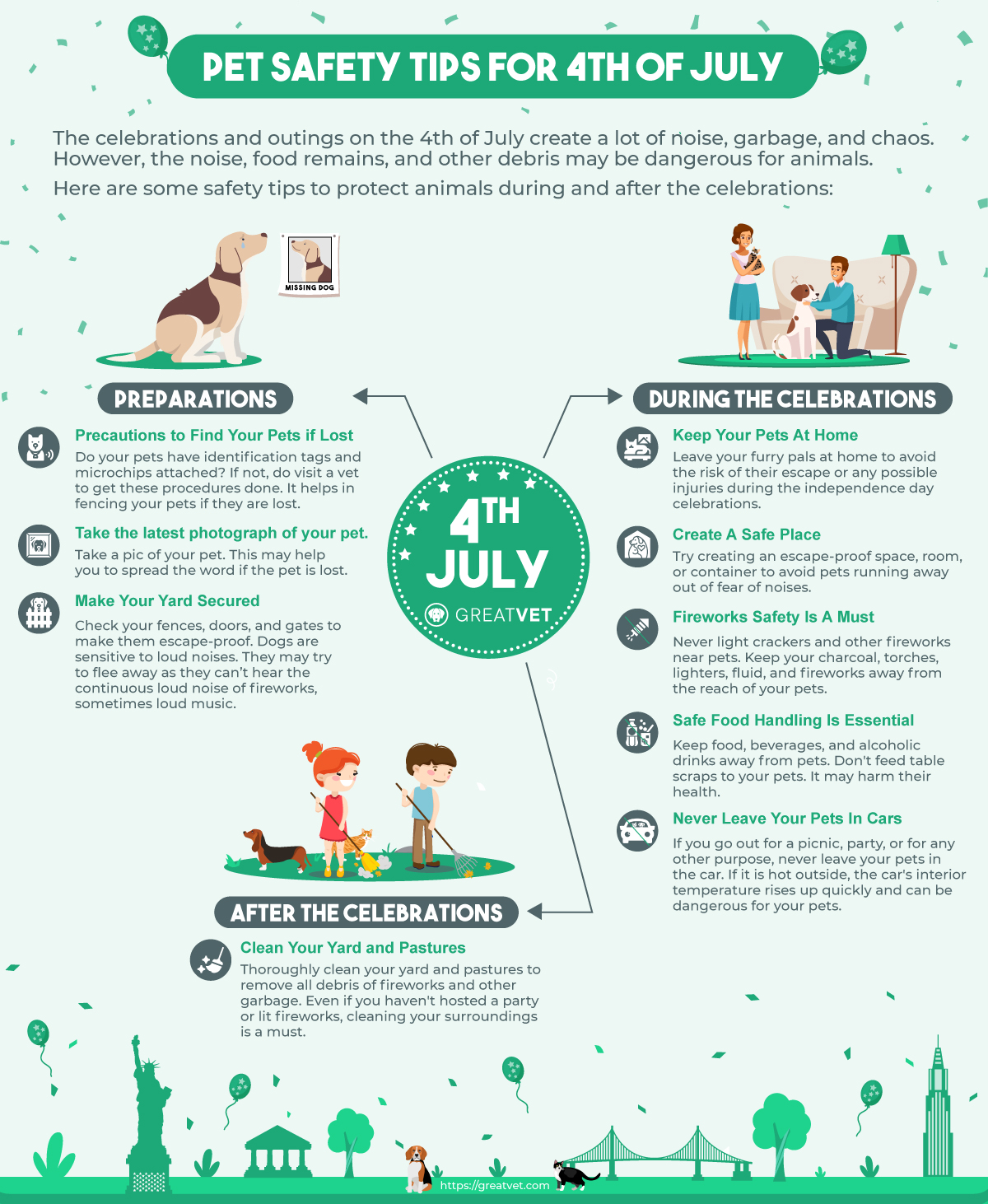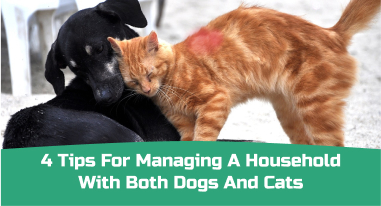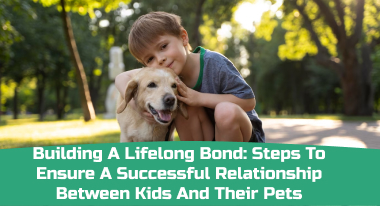Table of Contents
As the Fourth of July draws near, we recall happy memories of festivities, meals, and fireworks. Your dog or cat may be able to sense your enthusiasm, but there’s a strong probability that they are terrified of fireworks.
Our animal pals frequently experience anxiety when they hear loud noises, particularly fireworks. Additionally, if pets ingest hazardous waste, food scraps, or leftover barbeque debris, they may have heat stroke or possibly become poisoned.
If you bring your dogs to a Fourth of July celebration, take precautions to ensure that they are immune to several common illnesses.
You can keep your pet from becoming a “July 4th pet,” that gets scared, flees, and winds up in a shelter, by adhering to the straightforward pet safety tips provided below.
How Can I Keep My Pet Safe On The 4th Of July?
1. Always keep your pet indoors!
Even if your pet is habituated to being outside, fireworks or other loud noises may lead them to get frightened and break its leash or leap a fence in an attempt to reach safety.
2. Avoid giving your pet insect repellent that is not intended for use on pets.
You may use the same advice while applying “people” sunscreen to your pet. Even substances that are safe for humans might be harmful to animals. Drooling, vomiting, diarrhea, excessive thirst, and lethargy are among the harmful consequences of sunscreen on your pet that the ASPCA notes. Neurological problems might result from the popular pesticide DEET.
3. Alcohol Poisons Animals
If your pet consumes alcohol, they may become very drunk, slip into a coma, or in the worst situations, suffer respiratory failure and pass away. Yes, even beer is dangerous; dogs and cats cannot handle fermented hops or ethanol.
4. Attending an explosion of fireworks? Keep your pet home
The most secure environment for your pet is at home, not in a busy, strange, or noisy location. Your favorite pet will stress out and frantically look for refuge if there are too many people around and loud explosions. It’s also not a good idea to lock them in the car since your pet might have heat stroke and suffer brain damage.
5. Ensure that your pet is correctly identified
Without appropriate identification, it will be much more difficult to find your pet if they manage to escape and become lost. Consider giving your pet ID tags with their name and your phone number, a microchip for identification, or both. A current photo of your pets is also a good idea in case you need to put up notices.
6. Prevent Your Pet From Touching Glow Jewelry
Although the plastic decorations may seem adorable, your pet might consume them if they are chewed up. Although not very hazardous, the ASPCA warns that eating big chunks of the plastic containers might cause intestinal obstruction as well as excessive drooling and gastrointestinal distress.
7. NEVER Set off fireworks near animals
Even unlit fireworks can be dangerous for curious animals, leading to the possibility of serious burns and/or damage to the face and paws. Some pyrotechnics have harmful ingredients including arsenic, potassium nitrate, and other heavy metals in them.
8. Avoid Feeding “Table Food” to Your Pet
You might be tempted to give your pet some treats if you are enjoying a backyard barbecue. However, there are other holiday foods that could hurt your pet, just like alcohol and chocolate. For dogs and cats, potential risks include onions, coffee, avocados, grapes & raisins, salt, and yeast bread.
9. Pets Should Not Use Lighter Fluid or Matches
According to the ASPCA, chlorates are a dangerous chemical compound included in some matches that, if consumed by a pet, can impair breathing, injure blood cells, or even result in renal disease. Your pet may get skin irritation from contact with lighter fluid, lung issues from inhalation, and stomach issues from ingestion if exposed.
10. Citronella insect repellents are harmful to pets as well
The ASPCA states that irritant poisons to pets include oils, candles, mosquito coils, and other repellents containing citronella. Ingestion can affect your pet’s neurological system, and inhalation can result in serious respiratory conditions including pneumonia.
We produced this infographic to highlight pet safety tips for 4th of July. The infographic is meant to make the process easier for you to grasp and remember. The infographic is shown below:

Do’s and Don’ts For Your Dog On July 4th
| Do’s | Don’ts |
| Make sure your dog is wearing a collar with identification tags in case they get lost. | Don’t leave your dog outside unattended. |
| Take your dog for a walk before the fireworks start. | Don’t leave your dog in the car during the fireworks. |
| Provide a safe, quiet place for your dog to retreat to if they become scared or anxious. | Don’t leave your dog alone in the house. |
| Keep your dog on a leash or in a fenced area during the fireworks. | Don’t allow your dog to eat any food that may have been dropped on the ground during the fireworks. |
| Provide plenty of toys and treats to keep your dog entertained. | Don’t attempt to comfort your dog if they become scared or anxious. |
How Should You Schedule Your Pet’s Fourth of July Activities?
- On the holiday, be sure to take your dog for a walk early in the day. All summer long, heed that wise counsel. Your dog stays cooler and may be less susceptible to heat exhaustion.
- Don’t forget to provide your dogs a secure space indoors. Animals that are terrified of noises cannot unwind. Dogs often favor confined, compact spaces. This is an excellent alternative if your dog feels secure in a crate.
- Pets can be made more relaxed by removing visual stimuli. Keep the curtains drawn and the windows closed if you can. Blinds that have been drawn or their crate covered both work well.
- Leave your animal companion with something enjoyable to do, such as a frozen Kong loaded with the dog’s favorite goodies or a fresh, delectable bone.
To Summarize
Excluding your dogs from the Fourth of July celebrations, at least this year, is the smartest and safest course of action. Instead, while you are out enjoying the loud booms, bright lights, and spectator excitement, arrange a safe, secure place in the house for your dogs. The silence will be far more enjoyable for your dogs than the loudness will be for you.
FAQS
How do you calm an anxious dog on the 4th of July?
Answer: With these 4th of July dog safety recommendations, you can keep your pet quiet and secure.
- Sound training should be practiced
- Go for an Early Morning Walk
- Invest in an Anxiety Vest
- Establish a Safe Zone
- Be Available to Your Dog
- Consult with Your Vet
Do fireworks hurt dogs’ ears?
Answer: Because dogs’ ears are more sensitive than human ears, these loud noises may impair their hearing.
Can fireworks traumatize dogs?
Answer: Yes fireworks traumatize dogs. Fireworks trauma symptoms vary and may mirror symptoms of other underlying medical conditions.
Should I leave my dog alone during fireworks?
Answer: Never take your dog to a fireworks display or leave them outside during the show. Keep them (and cats) indoors instead, and if feasible, remain at home with them.




